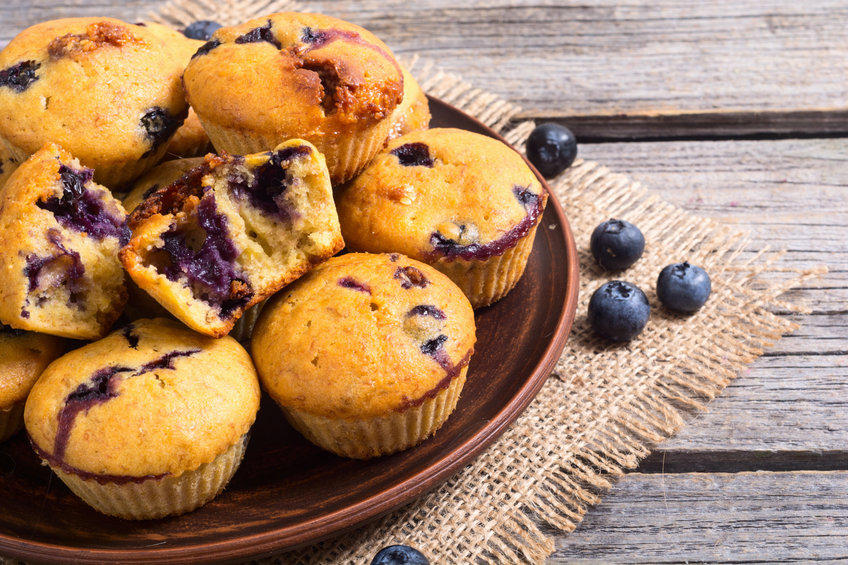
Baking powder is an essential ingredient in muffins and a range of baked goods.
If you follow a recipe that calls for baking powder, you need to follow it carefully to ensure that you get the best results.
As a leavening agent, baking powder causes the dough to rise.
It adds volume and affects the texture.
Baking powder can also influence the flavor so it’s important to use only as much as the recipe requires.
Baking Powder Helps Muffins to Rise
Baking powder is commonly used in muffin recipes to help them rise.
Muffin batters typically contain a combination of flour, sugar, eggs, milk, and butter or oil, which gives them a dense texture.
However, when baking powder is added to the batter, it reacts with the liquid and acidic ingredients to release carbon dioxide gas, which causes the muffins to rise and become lighter in texture.
It’s important to use the right amount of baking powder in muffin recipes, as too much or too little can affect the texture and rise of the muffins.
Most muffin recipes call for 1 to 2 teaspoons of baking powder per cup of flour, but this can vary depending on the recipe and the type of baking powder being used.
Is Baking Powder Different from Baking Soda?

Baking powder and baking soda are different ingredients, although they are both used in baking to help doughs and batters rise.
Baking soda (sodium bicarbonate) is a base, meaning it reacts with acids to produce carbon dioxide gas.
When baking soda is combined with an acidic ingredient, such as vinegar or lemon juice, it creates bubbles of carbon dioxide that cause a dough or batter to rise.
However, if too much baking soda is used, it can leave a bitter taste in baked goods.
Baking powder, on the other hand, contains baking soda and an acidic ingredient (usually cream of tartar) already mixed together.
This means that baking powder will create the necessary chemical reaction to make dough or batter rise when it is mixed with a liquid, without needing an additional acidic ingredient.
Baking powder also comes in two forms: single-acting and double-acting.
Single-acting baking powder will react with liquid right away, while double-acting baking powder reacts once when mixed with liquid and again when exposed to heat.
It’s important to note that you cannot substitute baking powder for baking soda or vice versa in a recipe, as the two ingredients behave differently in the chemical reaction that causes the dough or batter to rise.
Both baking powder and baking soda are used to achieve similar results, but they work in different ways.
They are also used in different ratios so you can’t simply exchange one for the other when following a recipe.
Because various recipes call for either ingredient (sometimes both) you should keep baking powder and baking soda on hand in your kitchen.
How Much Baking Powder Do You Need?
Baking powder makes the best muffins, but each recipe is a little different.
You should always follow the recipe instructions first. As you develop your skills as a home baker, you can start to experiment with your own creations.
- Generally, you will need at least 2 tsp of baking powder for every 2 cups of flour.
- When adding decorative or flavor ingredients to the mix, like chocolate chips or raisins, add 1/2 tsp baking powder per 1/2 cup of additional ingredients.
You can perfect your ratio over time based on the ingredients that you choose.
Baking is based on science, but it is an art form. As you begin to learn the chemical reactions, you’ll intuitively make changes to improve your recipes.
Avoid using too much baking powder as the results can be bitter and unpleasant.
Quick Facts – What Does Baking Powder Do for Muffins?

Baking powder plays a crucial role in the preparation of muffins, acting as a leavening agent that helps the batter rise and create a light, fluffy texture.
Without it, muffins would be dense and lack the desired consistency.
It’s important to note that while baking powder is similar to baking soda, it cannot be used as a direct substitution by weight.
This means that following the recipe’s instructions and measurements is crucial to ensure the correct amount of baking powder is used.
By understanding the crucial role of baking powder in muffin preparation, you can make sure that your homemade muffins are not only tasty but also have the perfect texture and consistency.
So, next time you’re baking muffins, remember the importance of baking powder and follow the recipe carefully for the best results.


